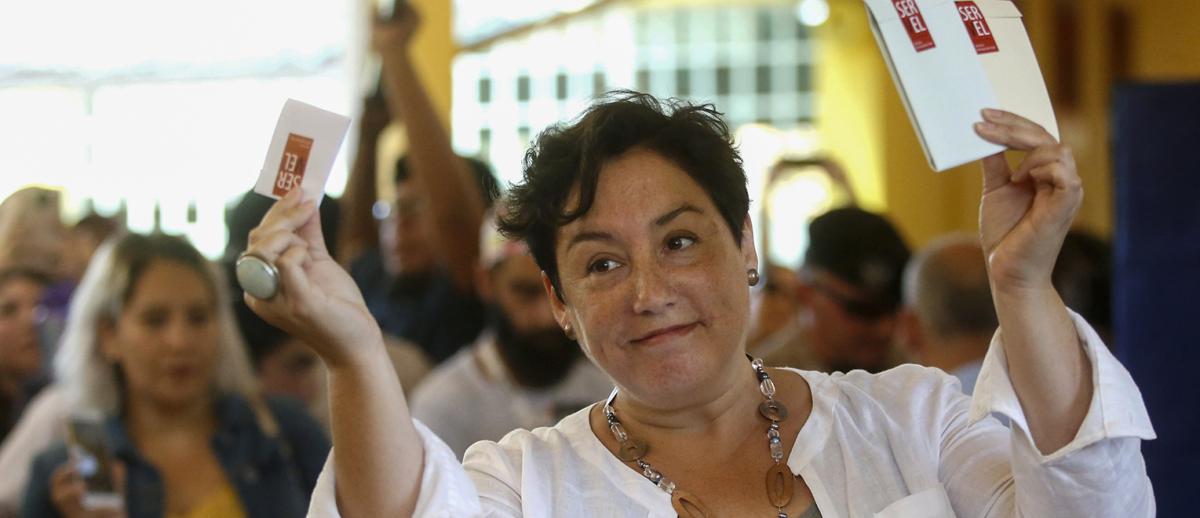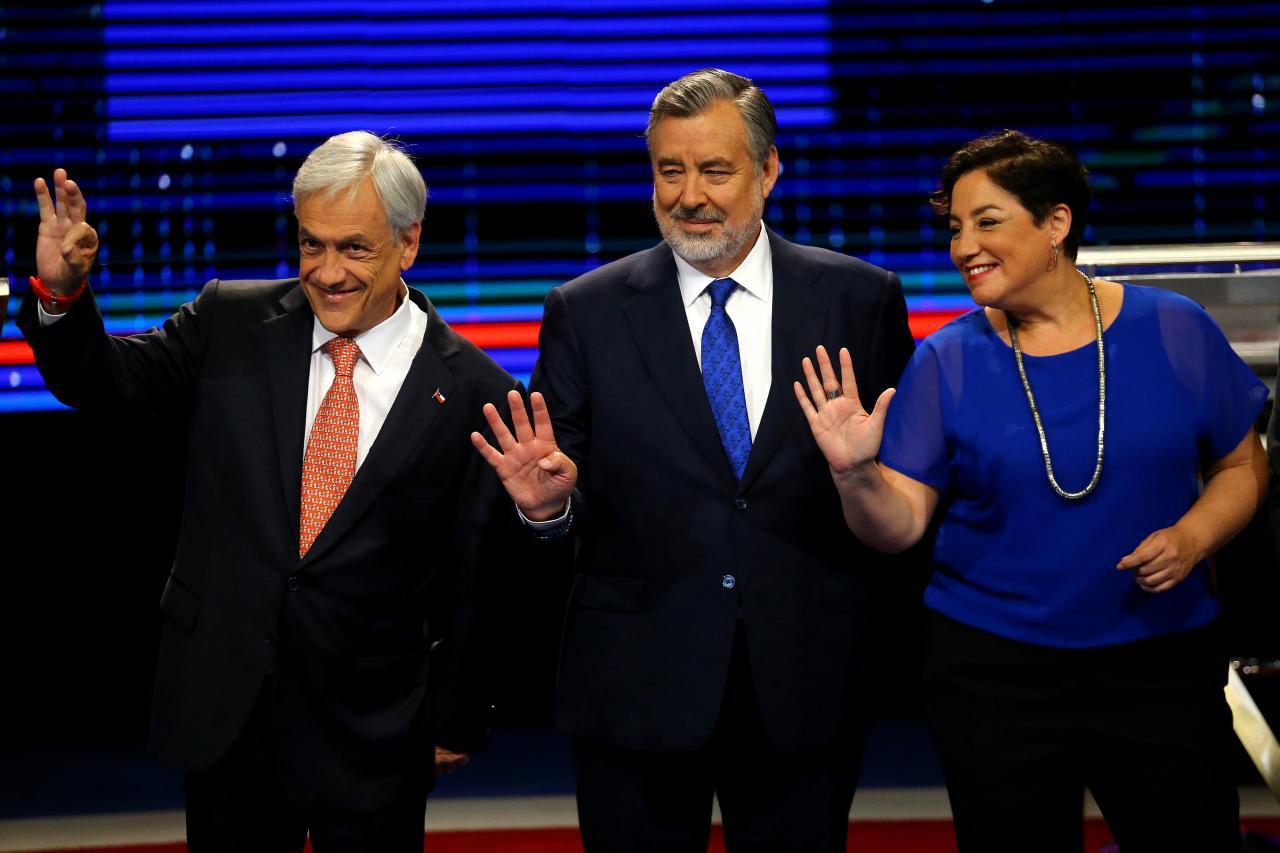Chile’s Next Transition
archive


Chile’s Next Transition
The first round of the Chilean presidential elections on November 19 generated a surprising result. Against most expectations, conservative favorite Sebastián Piñera got just 37 percent, while his main opponent, Alejandro Guillier of the left, achieved a respectable 23 percent. Yet the most notable result was the unexpected rise of the second leftist candidate Beatriz Sánchez with 20 percent, despite polls having not given her the slightest chance. The other two candidates, Carolina Goic of the Christian-Democrats and “Chile’s Donald Trump,” Jose-Antonio Kast of the far-right, got 6 and 8 percent respectively. This created a stalemate between the left and the right that will ensure a tight race until the decisive run-off round on December 17 between the two remaining candidates Piñera and Guillier. Thus, Chile’s November 19 elections have created the most interesting and unpredictable political constellation since the return to democracy in 1989.
For both final contestants, fortunes will depend on two things: first, how quickly they will be able to forge alliances behind a unified political agenda; second, whether they will able to effectively mobilize the electorate, since more than half of Chilean voters stayed at home in the first round. It will be interesting to see who will be playing games for what, and who will be sustainably helping whom. In Chile mutual benefits are often provided behind the closed doors of institutions and parties, below the radar of the public eye and in familiar circles beyond ideological borders or political beliefs; not all politicians have a long-term perspective or a political logic in the interest of the nation. Although former president Piñera (2010-14) remains the favorite and commented immediately after the vote: “The results are much like 2009, when we won,” the race is by no means decided. A broad alliance of the left could reach well beyond the 43 percent combined of its two main candidates and achieve 50 percent with the already secured support of Goic, if it can overcome its chronic bickering and the resulting split into countless micro-interests and groups. Piñera could reach 45 percent with the support of Kast, who immediately after the vote declared his unconditioned loyalty and commitment “to avoid the repetition of a leftist government” after the second term of outgoing President Michelle Bachelet (2014-18).
The result of the first electoral round is the more interesting, as all polls prior to voting saw the balance sheet of Bachelet’s second term as negative—plagued by half-fulfilled promises and political fragility. Against this background the election of Piñera seemed more or less secure, and most commentators saw as the only question whether or not he would be able to win in the first round by absolute majority.1
New Complexity, New Actors, and the Decline of Polling
Two factors evidenced by these elections will be decisive both for alliance strategies and Chile’s democratic future: first, the ongoing low voter participation rate of 46.7 percent, resulting from the introduction of voluntary voting in January 20122 by then president Piñera, who was accused at the time of aiming to reduce the participation of voters from the lower classes; and second, the emergence of new political forces with parliamentary representation. Their effects will impact the negotiation process leading up to the run-off round. Moreover, the number of combinations of potential pacts between leftist and rightist actors is unprecedented. The ensuing public debate over probabilities has emerged as a unique opportunity to reflect on the “country project” represented by each candidate, and on potential futures of the nation as a whole that may be more complex than leftist or rightist. While the level of participation in the second round remains uncertain, is is likely to further decrease as it has done in most preceding elections (in 2013 it was 49.3 percent in the first round, 41.96 percent in the run-off round). Nevertheless, the “anti-Piñera” effect could generate a revival of the left to unite against the powerful billionaire’s return to power. For its part, the conservative right faces a tremendous alignment challenge to prevent the left from remaining in power. To succeed it must elaborate a new rightist recipe—a more attractive cocktail of conservatism, efficiency, and growth with a distinct flavor of promoting a European style eco-social market economy. As many Chileans consider themselves more European than Europeans, such a move towards the conservative center is long overdue for Chile’s center-right landscape.
Chile’s November 19 elections have created the most interesting and unpredictable political constellation since the return to democracy in 1989.
Among the new forces entering Chile’s political scenery, there is on the one hand the unexpected rise of Beatriz Sánchez and the triumph of the second leftist alliance, the Frente Amplio (“Broad Front”), consisting of a very heterogenous mixture of communist and middle-class stripes, which was just founded earlier this year.3 On the other hand there is the return of the “strong right” in the person of “Chile’s Trump,” José Antonio Kast, who to the surprise of many garnered fourth place in November.4 Both were considered by polling institutes as absolute outsiders without any chance of a piece of the post-election pie. Yet both proved that the contemporary polling crisis in democratic elections is not an exclusively U.S. or European phenomenon, and that the populist wave remains vibrant also among Latin American democracies. Sánchez rightly called the November 19 vote “historic” and ridiculed the work of the nation’s leading public opinion research institutes, such as the Centro de Estudios Públicos (CEP), for being biased and irresponsible. Indeed, the only aspect in which all actors united, including losers like Carolina Goic of the Christian Democrats, was the condemnation of the opionion surveys, which they called “castrophic.”5 For his part, Kast, commenting through historian Gonzalo Rojas, stated that “we, the right, have now gained a solid basis for establishing a political party positioned towards the right of the conservative Chilean spectrum in the tradition of Jaime Guzmán.” Gúzman (1946-1991) had been a professor of constitutional law and senator under the dictatorship of Augusto Pinochet and is regarded as one of the leading rightist intellectuals of modern Chile, as well as one of the most important martyrs of the Chilean right.6

José Antonio Kast. Source: The Santiago Times
The Perspective: Coalitions and Options
So if Piñera and Kast manage to forge a stable and close coalition, a strong trend towards a position rightward of the conservative right should be expected—particularly if Kast succeeds in achieving an ideological role similar to Steve Bannon’s place as visioneer of an allegedly “contemporary” form of “consistent” conservativism. That would be in stark contrast to the aspiration of the moderate middle class, the majority of Chilean voters, for a social market economy approach that is European (German) in style. It could also alienate Piñera’s centrist alliance partners.
Therefore, the fate of the conservatives will depend on Piñera’s ability to negotiate his program with great flexibility, not scaring off the moderates yet somehow respecting the expectations of the populist right. In contrast, Alejandro Guillier will depend more on the suprising third party emerging from this election, i.e. the Frente Amplio and its alleged “third-way” option represented by Valparaíso mayor Jorge Sharp and others. Sharp claims that the run-off election could pave the way for a new ideological “identity” of Chile, overcoming the traditional dichotomy between left and right and proceeding toward a political program that is more similar to Bill Clinton and Tony Blair than to Marx and Engels, not to speak of Pinochet.7 As Sharp stated, “if the Frente Amplio can consolidate itself as a truly new emerging political force, it will be able to socially mobilize, and that could decide these elections, pointing toward greater popular participation in future democratic processes and elections. Our most important concern is the stability and governability of the country.” Yet the support of the Frente Amplio may also have undesirable side effects: it could annoy some moderate leftist voters of Guillier’s more traditional leftist coalition Nueva Majoría, inducing them to stay home in the run-off round; and it could have the effect of shifting the center of the leftist alliance further to the left, thus changing the ideological mindset of the center-oriented left where Chilean elections are usually won.
if Piñera and Kast manage to forge a stable and close coalition, a strong trend towards a position rightward of the conservative right should be expected.
Outlook
Over the past decade there was a rhetoric in Chile as in many other democracies worldwide that the center-oriented coalitions of the nation’s left and the right were barely distinguishable, that the democratic scenery lacked any dialectic between true alternatives and had thus become boring. As with Trump in the U.S. and the recent elections in Europe, the outcome of Chile’s presidential elections this November has proven the opposite. The sharp differences between the actual and potential coalitions and their respective options with respect to the socio-economic development of the nation are considerable. If the left succeeds in prolonging its mandate for four more years with the election of Guillier, the course of Chile will be towards a social democratic identity with a strong focus on social equality and class and gender emancipation, with Guillier trying to address the many unfulfilled reform promises of Bachelet. This outcome would provide a counter-weight to the diminishing influence of Western social democratic parties as evidenced by this year’s elections in Germany, France, Austria, and the UK. Then again, if the conservative right around Piñera wins, there will be a focus on a social market economy with insertions of populism and Trump-style rightist agendas, and more of an orientation rather towards competition than cooperation between social actors and greater emphasis on individual responsibility. Such a turn would mirror the present general trend within Western democracies. The two options also have different implications for Chile’s membership in the Transpacific Partnership (TPP).
Thus, the upcoming run-off round has long-term implications for Chile’s political culture, ideological identities, and socio-economic development. It also provides yet another test for progressive political movements pitted against resurgent right-wing nationalism and voter ennui.

Sebastián Piñera, Alejandro Guillier, Beatriz Sánchez. Source: Reuters
1. (In Spanish):
http://www.emol.com/noticias/Nacional/2017/11/02/881582/Marta-Lagos-directora-de-Mori-Chile-Mi-impresion-es-que-Pinera-gana-en-primera-vuelta.html.
See also: http://blogs.lse.ac.uk/latamcaribbean/2017/11/18/chiles-2017-presidential-election-evaluating-the-second-bachelet-government/
And:
http://blogs.lse.ac.uk/latamcaribbean/2017/11/19/chiles-2017-presidential-election-who-will-win-and-why/
2. See for example Marta Lagos, one of the prominent opinion polls anchorwoman
3. (In Spanish): http://www.latercera.com/noticia/beatriz-sanchez-las-encuestas-hubieran-dicho-la-verdad-tal-vez-estariamos-segunda-vuelta/
4. (in Spanish): http://www.latercera.com/noticia/kast-irrumpe-la-eleccion-presidencial-logra-cuarto-lugar/
5. (In Spanish): http://www.biobiochile.cl/noticias/nacional/chile/2017/11/19/la-fallida-prediccion-de-las-encuestas-asi-aseguraron-que-seria-el-resultado.shtml
6. Guzman was murdered in 1991 by members of the extremist leftist movement
7. (In Spanish): https://www.theclinic.cl/2017/11/20/jorge-sharp-creo-mucha-gente-voto-frente-amplio-ira-votar-la-derecha-mas-guillier/




